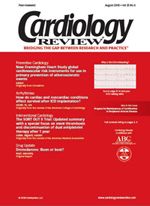Is C-reactive protein reduction with cholesterol-lowering therapies a lipid-independent effect?
A 55-year-old man with hypertension but no history of coronary or vascular disease presented for evaluation.
A 55-year-old man with hypertension but no history of coronary or vascular disease presented for evaluation. His wife demanded that he get a check-up because his busy lifestyle prevented him from taking care of himself. He was overweight at 230 pounds, but he stopped smoking 10 years earlier. His blood pressure was 165/90 mm Hg, but results of his physical examination and electrocardiogram were normal. He had a total cholesterol level of 250 mg/dL, low-density lipoprotein (LDL) level of 170 mg/dL, high-density lipoprotein level of 35 mg/dL, and triglyceride level of 210 mg/dL. His fasting glucose level was 105 mg/dL. His overall cardiovascular risk was high enough to warrant drug treatment, and he probably had subclinical atherosclerosis. He was started on blood pressure-lowering therapy and high-dose statin therapy. Is there any value in assessing high-sensitivity C-reactive protein (CRP) level to track the change in inflammation with these treatments?
Results of this study suggest that there is no value in this approach. The most intensive statin therapy would reduce the CRP level by about 40% to 50%. However, the variability in high-sensitivity CRP measurement with even mildly elevated CRP is fairly high. Even if the patient did not start taking any medications, if his baseline CRP level was in the range of 4 to 6 mg/L, his next CRP measurement could be anywhere from 2 to 4 mg/L or even as high as 6 to 8 mg/L. In contrast, if the patient is adherent to his medications, intensive statin therapy is almost always followed by a large reduction in LDL cholesterol level. A large decrease in LDL cholesterol level can reassure both the clinician and patient that the cardiovascular risk is lower, in part because of the reduction in inflammation associated with this therapy. Although the CRP level provides useful insights into the effects of therapies in research studies, it is of fairly limited value in clinical practice because of its wide biological variability in patients with intermediate or high values.
